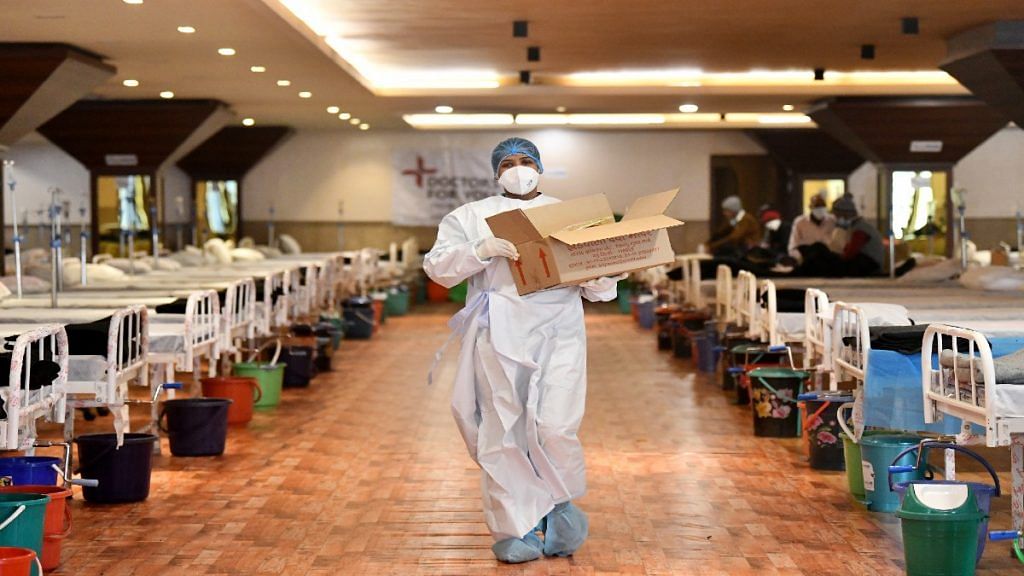New Delhi: The central government’s latest guidelines for clinical management of Covid-19 cases lists tuberculosis (TB) as one of the diseases that can put patients at “high risk” of severe infection with the SARS-CoV-2 virus.
Ailments like hypertension, diabetes and others that can compromise immunity are also on the list.
While the Centre had written to states way back in 2020 on bidirectional screening of TB and Covid patients — that is a patient of one should be compulsorily screened for the other — this is the first time that TB has been clearly classified as a comorbidity.
The health ministry had in its ‘National Strategic Plan for Tuberculosis Elimination 2017-2025’ called TB India’s “severest health crisis”, which kills an estimated 4,80,000 Indians every year and around 1,400 every day.
The latest clinical management guidelines, released Monday, include seven categories of people who are at “high risk” of severe Covid or mortality because of it — people aged above 60 years, those with cardiovascular disease, hypertension and coronary artery disease (CAD), people suffering from diabetes mellitus or immunocompromised states (such as HIV), patients of active tuberculosis, patients of chronic lung kidney or liver disease, people with cerebral vascular diseases, and obese people.
Also Read: ‘Mishandling Covid eroded support for populist govts like Modi’s’: Cambridge democracy study
‘Should have happened sooner’
Dr Virander Chauhan, former University Grants Commission (UGC) chairman and former director of the International Centre for Genetic Engineering and Biotechnology, where he currently holds the Arturo Falaschi Chair, told ThePrint that TB should have been recognised as a comorbidity earlier considering that “in the last two years, a lot more information has become available about the coronavirus”.
“TB is India’s largest infectious disease problem. Twenty-seven per cent of the world’s TB burden is in India. Covid, especially the Delta variant, has a tendency to affect the lungs. In a TB patient, often the lungs are already compromised and the patient sometimes has a breathing problem too,” he said.
“If we get rid of Covid tomorrow what will stare us in the face as the biggest public health problems are antimicrobial resistance and TB,” he added.
However, Dr Chauhan clarified that while TB may also affect the bones, or the spine or glands, the vulnerability of patients of pulmonary TB (a bacterial infection of the lungs) is the real concern. “Many of the other TBs are not even detected,” he added.
Covid has hampered TB care
According to a World Health Organisation (WHO) report released last year, India accounted for 41 per cent of the global dip in reporting TB cases during the Covid pandemic.
“The countries that contributed most to the global drop between 2019 and 2020 were India (41 per cent), Indonesia (14 per cent), the Philippines (12 per cent) and China (8 per cent); these and 12 other countries accounted for 93 per cent of the total global drop of 1.3 million,” said the report, titled ‘Global Tuberculosis Report 2021’.
State governments had at the time attributed the drop in reporting of TB cases to multiple reasons including lockdown and diversion of healthcare staff that normally work on TB, to Covid testing and tracking efforts.
According to the WHO report, for India, the TB case fatality ratio (estimated mortality/estimated incidence) went up to 20 per cent in 2020 from 17 per cent in 2019.
Globally, the goal is to end TB by 2030, but Prime Minister Narendra Modi had made a personal commitment in 2018 during the ‘End TB Summit’ in Delhi that India would do so five years ahead of the global schedule by 2025. The Covid pandemic now makes it look like a very difficult target to achieve.
Not only did the pandemic affect testing and tracking of TB patients, even routine vaccinations against TB were disrupted. According to an article published in October 2021 in the Japanese peer-reviewed journal ‘Tropical Medicine and Health’: “The advent of Covid-19 has further caused impediments in timely diagnosis of TB similar to other infectious diseases in the country. As per the available data, in March 2020, the number of children receiving the Bacillus Calmette–Guérin (BCG) vaccine was 2,60,000 less as compared to the previous year.
“These values had further gone down in April. The curve had shown slight improvement in May, and by June 2020, 23,000 fewer patients had received the full dose of BCG.”
(Edited by Gitanjali Das)
Also Read: Phytochemicals discovered in Himalayan plant Buransh that inhibit COVID-19 virus
